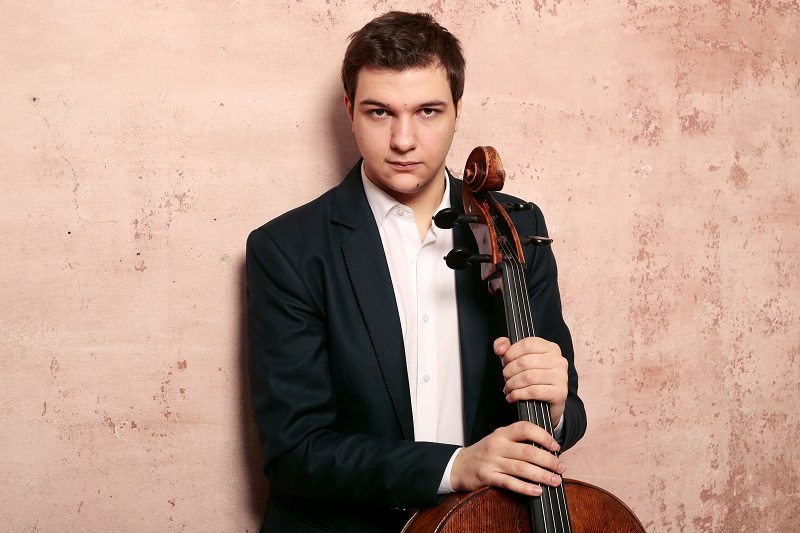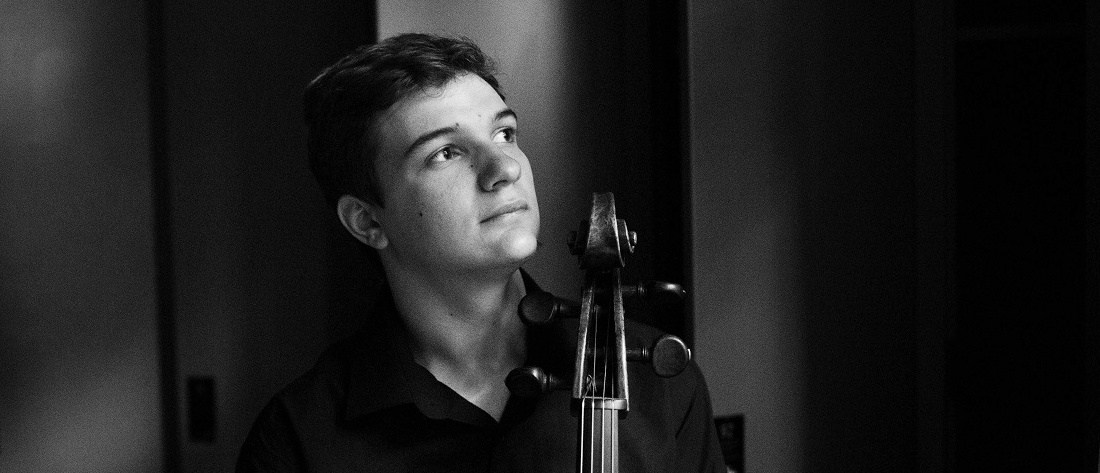Andrei Ioniţă only celebrated his twenty-second birthday last year, but his name has already shot up to prominence in the international press. In 2013 he won the Aram Khachaturian International Competition. A year later he was awarded second prize and a special prize in the ARD Music Competition in Munich, second prize in Grand Prix Emanuel Feuermann in Berlin and, above all, first prize in the 2015 International Tchaikovsky Competition in Moscow. Audiences worldwide witnessed his exceptional investment in his performance: in the second round, when he was playing the Shostakovich Cello Sonata, he was so overwhelmed that he started crying on stage. Since then Ioniţă has been on tour with conductor Valery Gergiev, and has collaborated e.g. with Gidon Kremer and Christian Tetzlaff. With new offers pouring in, Prague has been quick to express interest in the young cellist. With the Czech Philharmonic, Andrei Ioniţă will perform Cello Concerto No. 1 in E-flat major, Opus 107, by Dmitri Shostakovich.
Why did you choose the cello as your instrument?
Well, that’s quite a funny story! I actually started with piano when I was around 5 or 6 years old. My piano teacher proposed back then to my mom the idea of me studying a string instrument (I would rather call it inspiration…), so at the age of 8 we decided on taking the first cello lessons. It probably would have been a rather “late start” for violin, especially if one wanted to do that proficiently, besides, for starting learning cello one needs anyway slightly larger hands, so that was it! I guess it was all meant to be…
What are your musical influences?
Besides my two beloved teachers, Ani-Marie Paladi in Bucharest and now Jens Peter Maintz at the Berlin University of the Arts, I would name Daniil Shafran and Steven Isserlis as my cello heroes. I even got the chance to play Souvenir de Florence by Tchaikovsky with Steven Isserlis a couple of years ago, this special memory is still very vivid to me.
You have tasted the sweetness of success in very early of your life. How much has it changed your life?
I would say the beginning of my current career was the Tchaikovsky Competition, it’s really like the Olympic Games of classical music. I think that just after surviving that amount of pressure and going through all the rounds with such a huge repertoire you can bear literally anything afterwards! The amount of exposure the competition got especially last year, because of the online streaming done by Medici.tv, was probably the best thing about it, even better than winning the prize. For young artists it is vital that we get this sort of platform, that our voices are heard.

Andrei Ioniţă | photo: TVW
Winning the Tchaikovsky Competition has brought a collaboration with conductor Valery Gergiev to you…
I think the support young musicians get from Maestro Gergiev is admirable, especially in the case of Tchaikovsky, he just brought the competition to a new level. I already got the chance to play in London, Carnegie Hall, I am also very much looking forward to having my debut with the Munich Philharmonic under his baton in the upcoming May. We are also going to come in the same formula to the Enescu Festival in my hometown Bucharest, I guess it’s a dream come true!
Have you ever been to Prague? Are you looking forward to the collaboration with the Czech Philharmonic?
Prague is a lucky city for me, I had to travel twice through Prague to cello competitions and both times I won the 1st prize. But enough about competitions, I love walking around its beautiful streets and I am especially looking forward to collaborating with the Czech Philharmonic and performing in the amazing Rudolfinum, that’s another dream come true!
You are going to perform the Shostakovich’s Cello Concerto at the Prague concert. What is your relationship to this composer and this piece?
Shostakovich is arguably my favourite composer, ever since I discovered him in my early teenage years, I felt automatically connected to his passion, his sorrow, his hopeless sarcasm… besides his music is so intelligently written, you feel like every note falls into the right place. This applies of course to the first cello concerto as well, and its cadenza is probably one of the bitest ever written for cello. Of course it’s incredibly tiring to sustain music of such immense intensity, but at the same time performing it is such an unforgettable experience, every time you get to play it.
And what about the Dvořák’s Cello concerto?
Although the Shostakovich cello concerto is probably the closest to my heart, Dvorak still remains THE cello concerto, I think it’s really impossible to top that. It’s so romantic, so symphonic, so melodic, so easy to relate to… There are definitely enough reasons why it’s the most beloved concerto in the cello repertoire.
I cannot help asking if you have in your repertoire also the Cello Sonatas by George Enescu?
Unfortunately not yet, but I am looking forward to bringing to light the works such an underrated composer. Whenever I feel homesick, I start listening to his third violin sonata, it just takes you on a very special spiritual journey…
Do you also listen to non-classical music?
I always enjoy listening to jazz, or to ’70s music, like David Bowie, Pink Floyd, but also to bands like Radiohead, Blur, Gorillaz. I recently got into electroswing, it’s very uplifting!

Andrei Ioniţă | photo: TVW
What is your typical day like? How many hours per day do you practise?
I practice on average around 3-4 hours a day, but very concentrated, I think practicing the whole day without being smart and practical about it is one of the most dangerous things for young musicians. Otherwise, I try to enjoy life as much as possible, it’s important to have a well-balanced schedule. When I have some time off, I just like to hang out with my friends like everybody else, read a book, watch TV series…
Do you like living in Berlin?
Berlin became in the last couple of years the hotspot for classical music, so many young artists from around the world are moving here, and it’s an incredible phenomenon. The city is also still affordable in comparison to other major European capitals and of course it has an incredibly cool vibe. Nowadays, I guess it’s the place to be…
What cellos do you play?
I do own a modern French instrument, but it’s no comparison to the Rogeri I get as a loan from Deutsche Stiftung Musikleben in Hamburg. I like its dark but also warm colours, I think it also matches my perception on sound qualities. It’s also a blessing to play instruments with such a broad history, it’s more like we, musicians, are part of their lives and not the other way round.
What is the worst thing about playing the cello?
Maybe it’s not the easiest instrument to learn as a child, but otherwise I can’t really think of anything bad about this instrument: it has the most natural position of them all, its sound is the closest to human voice, and let’s not get started on the repertoire: it’s gorgeous.

